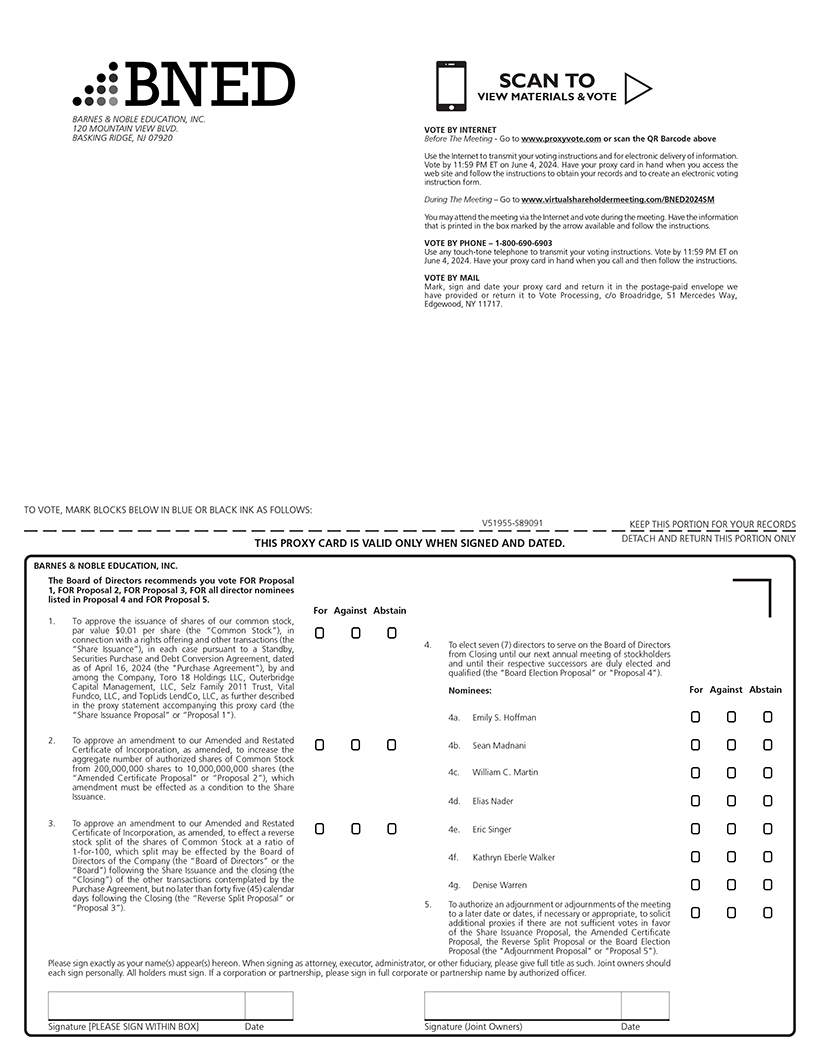
120 Mountain View Blvd.
Basking Ridge, New Jersey 07920
NOTICE OF SPECIAL MEETING OF STOCKHOLDERS
TO BE HELD ON JUNE 5, 2024
May 15, 2024
Dear Stockholder:
You are cordially invited to attend a special meeting of stockholders (such meeting, including any adjournments and postponements thereof, the “Special Meeting”) of Barnes & Noble Education, Inc., a Delaware corporation (“we,” “us,” “our,” “BNED” or the “Company”). The Special Meeting will be held at 10:00 a.m., Eastern Daylight Time, on June 5, 2024, by live online webcast for the following purposes:
| 1. | To approve the issuance of shares of our common stock, par value $0.01 per share (“Common Stock”), in connection with a rights offering and other transactions (the “Share Issuance”), in each case pursuant to a Standby, Securities Purchase and Debt Conversion Agreement, dated as of April 16, 2024 (the “Purchase Agreement”), by and among the Company, Toro 18 Holdings LLC, Outerbridge Capital Management, LLC, Selz Family 2011 Trust, Vital Fundco, LLC, and TopLids LendCo, LLC, as further described in the proxy statement accompanying this notice (the “Share Issuance Proposal” or “Proposal 1”); |
| 2. | To approve an amendment to our Amended and Restated Certificate of Incorporation, as amended, to increase the aggregate number of authorized shares of Common Stock from 200,000,000 shares to 10,000,000,000 shares (the “Amended Certificate Proposal” or “Proposal 2”), which amendment must be effected as a condition to the Share Issuance; |
| 3. | To approve an amendment to our Amended and Restated Certificate of Incorporation, as amended, to effect a reverse stock split of the shares of Common Stock at a ratio of 1-for-100, which split may be effected by the Board of Directors of the Company (the “Board of Directors” or the “Board”) following the Share Issuance and the closing (the “Closing”) of the other transactions contemplated by the Purchase Agreement, but no later than forty-five (45) calendar days following the Closing (the “Reverse Split Proposal” or “Proposal 3”); |
| 4. | To elect seven (7) directors to serve on the Board of Directors from Closing until our next annual meeting of stockholders and until their respective successors are duly elected and qualified (the “Board Election Proposal” or “Proposal 4”); and |
| 5. | To authorize an adjournment or adjournments of the meeting to a later date or dates, if necessary or appropriate, to solicit additional proxies if there are not sufficient votes in favor of the Share Issuance Proposal, the Amended Certificate Proposal, the Reverse Split Proposal or the Board Election Proposal (the “Adjournment Proposal” or “Proposal 5”). |
These items of business are more fully described in the proxy statement (the “Proxy Statement”) accompanying this notice (“Notice”). Also included with the Notice are a proxy card and postage-paid return envelope. Notwithstanding anything to the contrary in this document, our Board may decide in its discretion to proceed with the reverse stock split of the shares of Common Stock at a ratio of 1-for-100 if the Reverse Split Proposal is approved, even if the Purchase Agreement is terminated and the transactions thereunder are not consummated.



